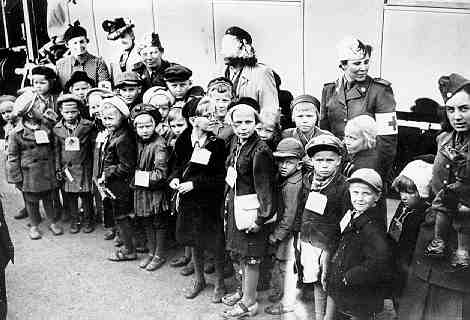A new study, led by Torsten Santavirta, assistant professor at the Institute for Housing and Urban Research at Uppsula University, investigates the intergenerational effects of adversity. The large-scale, multigenerational study, conducted in Sweden, was recently published in JAMA Psychiatry. The researchers report on the impact of a World War II program that evacuated Finnish children to Sweden for up to 5 years. Results of the study provide evidence for the intergenerational psychological impact of adverse childhood experiences, with female children of evacuees having higher rates of psychiatric hospitalizations. The researchers report:
“The finding of a multigenerational persistence of associations between unaccompanied evacuation and psychiatric hospitalizations for mood disorders among female offspring of exposed mothers is important for multiple reasons. First, this result contributes to evidence that suggests persistence in psychiatric harms of childhood trauma that reaches across generations. Second, results point to sex-specific patterns in this intergenerational persistence.”

Childhood adversity influences mental and physical development and has been linked to poorer physical and mental health outcomes, including increased rates of psychotic symptoms, bipolar disorder, and suicide. Experiencing armed conflict during childhood, a significant source of adversity, is also linked to shorter life expectancy and symptoms of PTSD, depression, and anxiety. Although the link between childhood adversity and challenges in adulthood is well established, less research exists on the intergenerational impact of adversity.
For example, “exposure to armed conflict during childhood could have an enduring association with psychological development that results in adverse parenting styles in adulthood, selection into adverse adult environments, epigenetic changes that are transmitted to the next generation, and, for women, alterations in pregnancy and consequently fetal development,” write the researchers.
Research on Holocaust survivors and refugees suggests that being a child of someone who experienced adversity impacts psychosocial functioning and mental health. However, these studies were relatively small and did not include comparison groups.
The researchers conducted a previous study investigating the impact of being evacuated from Finland to Sweden as a child during World War II. Results show “girls (but not boys) evacuated to Sweden during the war were more than twice as likely to be hospitalized for a mood disorder during adulthood than their nonevacuated siblings.”
To extend on that study, the authors explore “the intergenerational association of war exposures with mental health” by investigating “whether offspring of the Finnish evacuees were more likely to be hospitalized for a mental disorder than offspring of nonevacuees.” The researchers conducted multi-generational, population-based cohort study.
They reviewed data on Finnish individuals born from 1933-1944, and their children born from 1950-2010. Because of the guidelines for the World War II Finnish evacuation program, many families did not evacuate all their children. Therefore, the researchers were able to analyze psychiatric hospitalizations for children whose parents were evacuees compared to their cousins of nonevacuated parents. A total of 46,877 individuals who experienced World War II events as children and 93,391 of their offspring were included in the analysis. Of the offspring, 2992 had parents who participated in the Swedish evacuation program.
The most substantial finding comes from the analysis that compared cousins whose parents were or were not evacuated: For women, “having a mother who was evacuated during childhood was associated with a higher risk of psychiatric hospitalization (HR, 2.04; 95% CI, 1.04-4.01).” The effect was stronger if the mother was hospitalized for a psychiatric condition more than once, but mother’s psychiatric hospitalizations did not fully account for this finding.
The researchers state this “suggests intergenerational persistence for women in the psychiatric consequences of participation in the Finnish evacuation induced by the adverse events during World War II.” Results do not show an association between parental evacuation and psychiatric hospitalization for male children of evacuees.
The authors note differences between the Finnish evacuation of children to Sweden versus today’s refugee crisis, mainly that modern refugees may be displaced from their home country for much longer periods of time.
“One might therefore expect the intergenerational consequences of war-related experiences during childhood to be even stronger today, although this expectation should be investigated in contemporary settings, particularly in light of the global crisis of childhood displacement.”
Research is increasingly focusing on how to support the mental well-being children living in armed conflict areas, including an emphasis on the strength and resiliency shown by children facing adversity. This research should also extend to intergenerational trauma.
****
Santavirta, T., Santavirta, N., & Gilman, S. E. (2017). Association of the World War II Finnish evacuation of children with psychiatric hospitalization in the next generation. JAMA Psychiatry. Advance online publication. doi:10.1001/jamapsychiatry.2017.3511 (Link)














